Discovering the Power of Business and Community Through Religious Organizations and Churches in NYC

In the vibrant landscape of New York City, religious organizations and churches serve as vital pillars that uplift communities, foster meaningful connections, and drive impactful initiatives. Platforms such as https://bridgechurchnyc.com/ exemplify how faith-based institutions intertwine with business, community service, and non-profit efforts to create a thriving ecosystem that benefits all residents and stakeholders.
The Role of Religious Organizations in Business Growth
Religious organizations, including churches like https://bridgechurchnyc.com/, go beyond spiritual guidance—they significantly influence local economies by fostering entrepreneurship, supporting small businesses, and encouraging ethical business practices. These institutions serve as incubators for community-driven economic development, often acting as catalysts for business success.
How Churches Contribute to Local Business Ecosystems
- Networking Opportunities: Churches provide venues for entrepreneurs and business owners to connect, share ideas, and collaborate on projects that benefit the community.
- Promotion and Support: Faith-based organizations actively promote local businesses through events, newsletters, and social media engagement, thereby increasing visibility in the neighborhood.
- Leadership Development: Many churches offer workshops, seminars, and mentorship programs focusing on entrepreneurship, financial literacy, and leadership skills, empowering individuals to succeed.
- Social Capital Building: They serve as trust-building entities that encourage mutual support and cooperation among local businesses and residents.
Impact of Religious Organizations on Community Development
Religious institutions like https://bridgechurchnyc.com/ play an instrumental role in fostering resilience, unity, and growth within urban neighborhoods. Their multifaceted approach includes social services, community outreach, and advocacy, which collectively contribute to a healthier, more vibrant society.
Community Service and Non-Profit Initiatives
Many churches operate as non-profits, actively engaging in community service that addresses social issues such as homelessness, hunger, and education disparities. Their programs create a ripple effect—uplifting vulnerable populations and promoting social equity.
- Food Pantries and Soup Kitchens: Providing nutritious meals and essentials to those in need.
- Educational Programs: Offering tutoring, literacy classes, and vocational training to empower community members.
- Support for Homeless and At-Risk Populations: Shelters, job placement assistance, and mental health support services.
- Health and Wellness Initiatives: Promoting mental health awareness and providing health screenings.
Building Bridges: How Churches Foster Interfaith and Community Collaboration
The strength of https://bridgechurchnyc.com/ lies in its commitment to unity, respect, and mutual understanding among diverse faiths and communities. This bridge-building fosters an inclusive environment where different cultural backgrounds can collaborate for the collective good.
Interfaith collaborations often lead to powerful community projects—such as multicultural festivals, joint charity drives, and dialogue forums—that promote tolerance and peace, reinforcing social cohesion and economic stability.
Innovative Programs and Modern Approaches
Today’s churches are embracing innovative strategies to extend their reach and impact, including:
- Digital Outreach: Utilizing social media and online platforms to connect with younger generations and broader audiences.
- Partnerships with Local Businesses: Collaborating on community events, markets, and educational initiatives.
- Environmental Stewardship: Promoting sustainable practices and environmental justice as part of faith-based activism.
- Cultural Programming: Hosting art exhibits, music festivals, and cultural discussions to celebrate diversity.
The Transformative Power of Faith-Based Leadership in Business and Community
At the heart of these endeavors is visionary leadership rooted in faith—leaders who inspire action, instill hope, and serve as models of integrity and compassion. Their influence extends beyond spiritual guidance to encompass economic development, social justice, and community resilience.
Such leadership emphasizes ethical business practices, sustainable development, and the importance of giving back—values that resonate deeply within local neighborhoods and contribute to long-term communal prosperity.
Case Study: The Success of https://bridgechurchnyc.com/
As a thriving example, this church exemplifies how Faith-based organizations can serve as anchors for community empowerment. Through its range of programs—covering spiritual growth, economic support, and social outreach—it demonstrates how organized, compassionate leadership can catalyze positive change.
Conclusion: Embracing the Synergy of Faith, Business, and Community
The dynamic intersection of religious organizations, churches like https://bridgechurchnyc.com/, business, and community service creates a resilient, thriving environment in NYC. These faith-based institutions play a crucial role not only in spiritual nurturing but also in economic development, social justice, and community cohesion.
By fostering partnerships, inspiring ethical practices, and leading impactful initiatives, these organizations exemplify the transformative potential of faith-led community engagement. For residents, entrepreneurs, and stakeholders alike, embracing this synergy is essential for building a more inclusive, prosperous, and compassionate city.
Join the movement of faith-driven community transformation and discover how https://bridgechurchnyc.com/ continues to make a difference across NYC.









